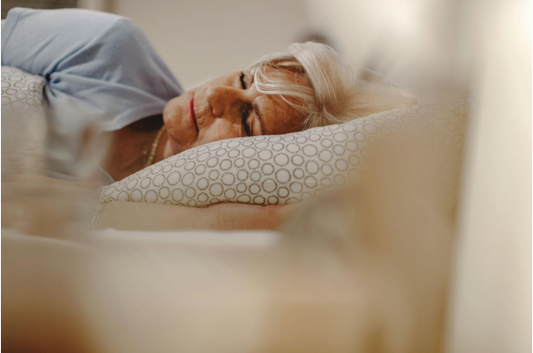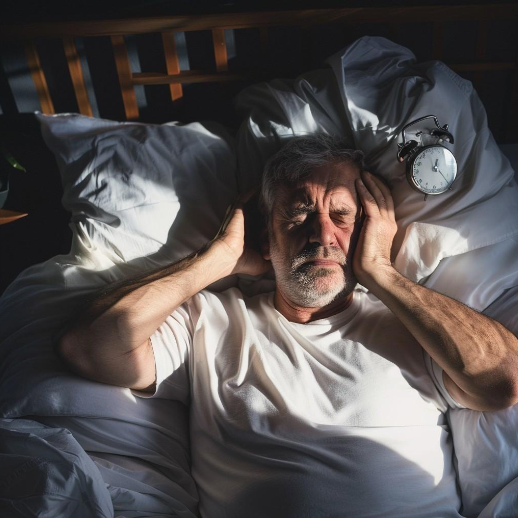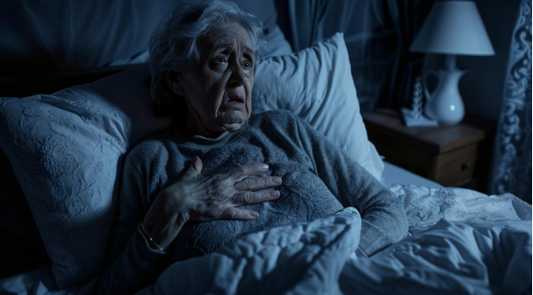As we age, sleep often becomes more elusive, leaving many seniors wondering why restful nights seem harder to grasp. Aging brings changes in our sleep cycles and circadian rhythms, making it common to face disrupted sleep. It's not just less sleep; it's about waking more often during the night and feeling less refreshed. Understanding these shifts is essential because quality sleep fuels everything from memory to mood. Whether you're struggling to snooze soundly or just curious about these changes, learning about the impact of aging on sleep can open doors to better rest and improved wellness. Stay tuned as we explore how you can tackle these sleep challenges head-on.
Understanding Aging and Sleep Changes
As we grow older, we often hear that sleep can become more elusive. But why does this happen? Our sleep patterns, much like the rest of our bodies, transform in unique ways as we age. To better tackle sleep challenges, let's explore the science behind it.
Physiological Changes in Sleep Patterns
Getting restful sleep often feels like a tug-of-war as we age. Physiological changes affect how and when we sleep:
- Reduced Total Sleep Time: Seniors typically require about the same amount of sleep as younger adults—7 to 9 hours a night—but achieving it can be tricky. Many experience shortened sleep cycles, leading to less overall sleep.
- Alterations in Sleep Cycles: Ever notice how some seniors wake up at the crack of dawn? This is due to changes in their circadian rhythms. Older adults tend to fall asleep earlier in the evening and wake up earlier in the morning.
- Increased Wakefulness During the Night: Frequent nighttime awakenings become common. This can be caused by lighter sleep stages, making it easier to wake up from even the smallest disturbances like noise or light.
These shifts might feel frustrating, but understanding them can help in finding ways to get better rest.
Neurological Factors
The brain's aging process is another significant player in sleep changes:
- Impact on Sleep Quality: With age, there is a gradual decline in slow-wave sleep, which is considered the most restorative stage. Less slow-wave sleep often means waking up feeling less refreshed.
- Regulation of Circadian Rhythms: As our internal clock ticks on, it can sometimes become less precise. The brain's ability to regulate these rhythms may weaken, causing sleep-wake cycles to be inconsistent.
These neurological adjustments can sometimes feel like a puzzle. While they may make sleep feel more like a patchwork quilt—bits and pieces throughout the night—understanding them is the first step in weaving together a better night's sleep.
As we age, it’s essential to recognize these sleep changes not as a burden but as part of the natural ebb and flow of life. Finding small ways to adjust habits or environments can make a big difference, turning that elusive rest into a refreshing reality. Keep reading to discover more strategies that can help regain a peaceful slumber.
Common Sleep Disorders in Seniors
As we age, sleep can become more elusive. You're not alone if you find nights growing shorter and mornings more fatigued. Understanding the common sleep disorders that impact seniors can empower you with the knowledge to take action. Let's explore two primary culprits: Insomnia and Sleep Apnea.
Insomnia and Its Effects
Insomnia is often seen as the nemesis of a good night's rest among seniors. Have you ever found yourself staring at the ceiling, counting sheep that just won't settle? Insomnia is like a thief, silently stealing the precious hours meant for rest.
Causes of Insomnia in Seniors:
- Physical Health Issues: Chronic illnesses like arthritis or heart disease can make falling asleep difficult.
- Mental Health Conditions: Anxiety and depression are known to disrupt sleep.
- Medications: Some drugs, particularly those for high blood pressure or depression, may have side effects affecting sleep.
- Lifestyle Changes: Retirement might lead to less activity, disrupting natural sleep cycles.
Symptoms of Insomnia:
- Trouble Falling Asleep: Lying awake for hours, unable to drift off.
- Interrupted Sleep: Frequent awakenings throughout the night.
- Early Morning Awakening: Waking up too early and not being able to return to sleep.
Implications of Insomnia:
Insomnia goes beyond mere sleeplessness. It might cause daytime sleepiness, irritability, or even cognitive decline. Struggling with focus and memory might leave you feeling like you're walking through a fog.
Sleep Apnea in Older Adults
Sleep Apnea is more than just snoring. It's a serious condition where breathing repeatedly stops and starts during sleep. Imagine feeling like your sleep is constantly interrupted by a blaring alarm clock that you can't shut off.
Symptoms of Sleep Apnea:
- Loud Snoring: Snoring that sometimes pauses with silence followed by a gasp.
- Daytime Sleepiness: Feelings of exhaustion despite a full night’s sleep.
- Memory and Concentration Issues: Struggling to focus or recall details.
- Mood Changes: Increased irritability or depression.
Potential Health Risks:
- Heart Problems: Increased risk of high blood pressure, heart attack, or stroke.
- Diabetes: Sleep apnea can worsen insulin resistance.
- Cognitive Decline: Linked to memory loss and impaired decision-making.
Understanding these common sleep disorders in seniors can help you seek solutions. Whether you're battling insomnia or sleep apnea, recognizing the symptoms is the first step toward regaining restful nights and energetic days.
Strategies for Improving Sleep Quality
As we age, getting a good night's sleep can sometimes feel like chasing shadows. Many seniors face sleep struggles, causing restless nights that impact daily life. But fear not!
There are simple strategies that can help improve sleep quality, making the dream of better rest a reality.
Establishing a Sleep Routine
Why should you stick to a schedule? Just like toddlers, adults benefit from going to bed and getting up at the same time every day. Consistency helps regulate your body's internal clock, making it easier to fall asleep and wake up each morning.
- Set a specific bedtime: Choose a time when you naturally feel tired. This will help you maintain the routine more easily.
- Wake up at the same time every day, even on weekends. This keeps your sleep clock in sync.
- Limit naps: If you need a nap, keep it brief and avoid doing it late in the day.
Building a sleep routine is like teaching your body when to wind down, so it knows when it's time for rest and recovery.
Creating a Sleep-Friendly Environment
The bedroom should be a peaceful sanctuary, setting the stage for restful slumber. Little changes to your environment can lead to big improvements in sleep quality.
- Keep it cool and dark: A slightly cooler room and blackout curtains can mimic nighttime, signaling your brain it's time to sleep.
- Limit noise: Consider using earplugs or a white noise machine to block out disruptions.
- Choose comfy bedding: Invest in a good mattress and pillows to support your comfort needs.
- Limit electronic use: Screens emit blue light that confuses your body's sleep signals. Put devices away an hour before bed.
By transforming your room into a cozy retreat, you remove barriers to falling and staying asleep.
Lifestyle Changes to Promote Better Sleep
Our daily choices, from what we eat to how we manage stress, greatly influence our sleep. Here are some lifestyle tweaks to try:
- Exercise regularly: Physical activity during the day can make falling asleep easier. Avoid working out too close to bedtime, as it may energize you.
- Mind what you eat and drink: Avoid large meals, caffeine, and alcohol close to bedtime. A light snack, like yogurt or a banana, can sometimes help.
- Manage stress and anxiety: Techniques like meditation or deep-breathing exercises can help calm the mind before bed.
Think of these changes as the nuts and bolts of your sleep toolkit. With them, you can build a better sleep experience.
These strategies might seem straightforward, but they're the foundation for improving sleep quality. By taking charge of routine, environment, and lifestyle, you're giving yourself the best shot at restful nights and lively days.
Conclusion
As we age, understanding sleep changes becomes crucial for maintaining our overall health. Alterations in sleep patterns, such as reduced deep sleep and increased awakenings, can impact the physical and mental well-being of seniors. Recognizing these changes is the first step towards addressing them.
Improving sleep quality can significantly enhance life quality for seniors. Seeking professional advice can pave the way to better sleep habits and address underlying issues. Simple adjustments to bedtime routines and the sleep environment can provide relief.
If you're struggling with sleep, don't hesitate to reach out for help. Your well-being is worth it. Remember, better sleep leads to a healthier and happier life.
P.S.
If you are having difficulty with sleeping, you are not alone. There are many folks out there who want to know what the most effective natural sleep aid is to get them back to snoozing again. Fix My Sleep is a great resource for all those who have trouble sleeping and are looking for innovative tips and sleep products to help them get a good night’s sleep.





